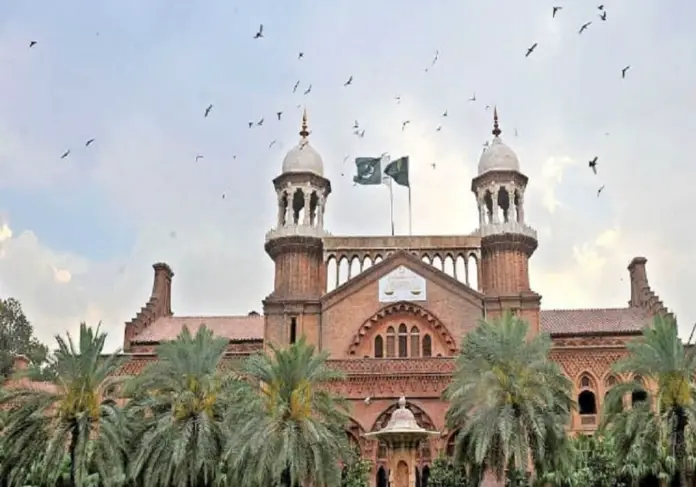The long impasse regarding administering oath to Punjab Chief Minister-elect Hamza Shahbaz finally ended on Friday after the Lahore High Court (LHC) allowed the Pakistan Muslim League-Nawaz PML-N leader’s petition and directed the National Assembly speaker to administer oath to him today at 11:30am in Lahore.
Justice Jawad Hassan of the LHC announced the verdict reserved earlier in the day after hearing lengthy arguments of both sides on Hamza’s petition, which he had filed for the third time. Hamza was elected the Punjab chief minister on April 16 during a provincial assembly session that was marred by ruckus inside the legislative assembly.
Chief Justice Muhammad Ameer Bhatti had earlier given two judgments on the petition moved by Hamza and asked the Punjab governor to complete the process of administration of oath to the newly elected Punjab chief minister, either himself or through his nominee, and gave him a day to comply with the orders.
In a nine-page short order, Justice Jawad held, “For what has been discussed above and in the light of directions/suggestions given by this court in the judgments and the law laid down by the Hon’ble Supreme Court of Pakistan, which are binding on the courts under Article 189 of the Constitution, this petition is allowed.”
At the outset of the hearing, Justice Jawad asked about the order passed by the LHC chief justice. Subsequently, Hamza’s lawyer Khalid Ishaq read the order out loud and told the court that the president and the Punjab governor were blatantly violating the constitution.
Justice Jawad Hassan remarked that no one should have the audacity to flout the court’s directives. “This concerns the respect of the high court and Pakistan’s judiciary,” he said.
He also regretted the fact that two orders passed by the high court were not implemented, adding that he would make a decision based on the constitution.
Strict security arrangements were made as heavy contingents of police were deployed at the LHC to avoid any untoward incident.
The court relied upon Article 255 of the Constitution and interpreted it by holding that, “Word ‘impracticable’ used makes it quite clear that the oath is to be made before a specific person and in case it is impracticable for the reason it may be made before such person as may be nominated by that person. Both the decisions of this court, despite having binding effect, have been ignored deliberately by the president of Pakistan as well as governor of the Punjab.” Justice Jawad also examined Article 5 of the Constitution, which casts upon a duty on every citizen to be loyal to the state.
Arguing before the court, the counsel representing Hamza preferred not to file a contempt petition against non-compliance of the court orders and sought interpretation of Article 255 of the Constitution. It was the third petition he had filed on the same subject matter owing to the “defiant attitude” of President Arif Alvi and the province’s governor, Omar Sarfraz Cheema.
When the petitioner’s lawyer told the court that the governor had refused to administer oath to Hamza, Justice Jawad asked him as to why he did not make the president or the governor respondents in his petition. On this, Hamza’s lawyer said there was no need to make them respondents in the case because he wanted the court orders implemented instead.
Punjab Additional Advocate General Umair Niazi argued that proceedings could only move forward once the Punjab advocate general was issued a notice under Article 27-A of the Constitution. He said the Punjab governor had sent the matter to the president, so it was imprudent to administer the oath when the matter was with the Presidency.
He informed the court that the Senate chairman could administer the oath, but he was not in the country, pointing out that the president or the Punjab governor could administer the oath or nominate their representative for the purpose. Representing the Pakistan Tehreek-e-Insaf (PTI), Advocate Azhar Siddique moved a plea to become party to the case.
“In all the orders, the president and the Punjab governor were not heard,” he said, arguing how an order could be passed without hearing them.
Addressing the court, he said, “We filed an intra-court appeal against the order, but the same was objected to by the registrar office.” Justice Jawad asked him whom he was representing in the courtroom, to which he replied that he was the counsel for parliamentarians.
Siddique argued that the decision of the single bench was against the law, as this court did not have such powers. “The CJ himself sent the advice to the president,” he contended.
Later, talking to MinuteMirror, Siddique said he would file an intra-court appeal against Friday’s verdict. “We have read this decision. This is another attempt to write a new constitution,” he said, adding that the president still had 25 days to resolve this issue.
He also said the verdict was a violation of Article 10-A of the Constitution, as neither the president nor the Punjab governor was heard in this matter.
Meanwhile, Punjab Assembly Speaker Chaudhry Parvez Elahi also said his party would challenge the court decision regarding Hamza’s oath. Talking to a private news channel, he said there was no election in the assembly, so they went to the courts to seek justice.







